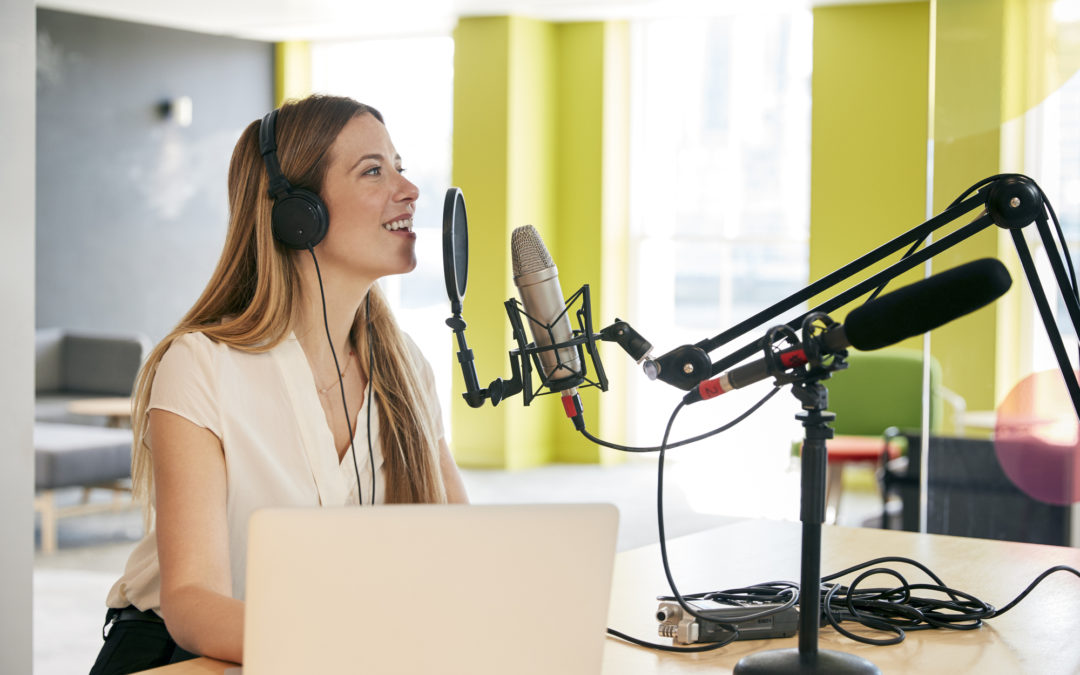
by Amber Miller | Aug 16, 2023 | Blog, Podcast
You can plan your content to meet the needs of your audience perfectly, but there’s one simple mistake that can sabotage all your efforts – poor sound quality.
Poor sound quality is a major turn-off for podcasting audiences because it significantly impacts the listener’s experience.
A show with poor quality can be irritating to listen to. It may even be hard to hear what the host is saying.
What does poor quality mean?
It could include:
- Background noise
- Muffled voices
- Inconsistent sound levels
- Cheap-sounding music or sound effects
- Echoes or other distractions
- Awkward editing, such as abrupt cuts or long silences
- Poor microphone technique that results in popping, breathing sounds, or varying volume
How do you avoid these issues?
It all starts with a good microphone. This is one essential investment you need to make for your show.
To get started, you can buy a simple USB microphone and then upgrade as your show progresses.
You also need the right recording environment. Find a place to record where there aren’t background noises.
Another thing that helps is to use headphones while recording. These should be closed-back and cover your ears fully, not earbuds.
Headphones will help you catch background noises and other extraneous sounds while recording.
Experiment with the recording environment and mic placement to see what produces the best sound.
Finally, listen to your audience’s feedback. If you’re getting comments about audio quality, make the necessary changes.
Remember, while you should strive for the best audio quality possible, don’t let perfectionism hold you back. It’s better to start with what you have and improve as you go than not to start at all.
Let’s chat if you would like help with your podcast.

by Amber Miller | Aug 9, 2023 | Blog, Podcast
Podcasting has emerged as a powerful tool for engaging with audiences and expanding brand awareness in recent years. They are extremely popular, offering content on a wide variety of topics.
Have you thought about starting your own? Here are 10 reasons why every business should consider launching a podcast.
1. Broaden and Diversify Your Reach
Podcasting allows you to tap into a vast and diverse audience base. You can target any segment of the market and find listeners around the world. This is a great way to broaden your brand’s reach and gain exposure in sectors of the market that you otherwise couldn’t have.
For example, if you have a fitness brand, you might create a podcast for a specific demographic like runners, weightlifters, or yoga practitioners. On the other hand, a software company might make a show about technology trends, entrepreneurship, or business growth strategies to attract listeners beyond their usual customer base.
2. Establish Your Authority
You can dive deep into topics relevant to your audience through your podcast. You’re also able to position yourself as an expert in your niche by offering in-depth analysis, tips, and strategies that help your listeners overcome challenges and solve problems. By addressing their pain points and providing practical solutions, you become a valuable resource for your audience.
Interviewing high-profile guests is another powerful way to build your reputation in your niche. You can invite industry leaders, influencers, and experts to share their insights and experiences. This shows you’re well-connected within your industry and respected by your peers.
3. Create a Personal Connection
Compared to other types of content, the audio format fosters a sense of familiarity and authenticity. The personal touch and conversational nature create a deep connection, making your listeners feel like they’re part of a conversation with you.
Podcasts also provide opportunities for audience interaction and engagement. Listeners can send in questions, leave comments, or provide feedback. Then you can address these in future episodes. This direct line of communication enables you to further strengthen the relationship with your audience by acknowledging their input and making them feel heard.
4. Easy to Enjoy
Podcasts are an easy medium for your audience to enjoy. This is one of the reasons they’re so popular. Podcasts seamlessly fit into people’s daily routines. They’ll listen to your show while they’re going to work, exercising, or doing things around the house.
5. Easy to Produce
One of the main advantages of podcasting as a marketing strategy is its affordability. Compared to other forms of content creation, the upfront investment required to get started is relatively minimal.
All you need to get started is some essential audio equipment. This includes a microphone, headphones, a computer or laptop, and editing software. You’ll also need to pay for hosting, but this can be a very low cost, depending on the features and storage you need.
6. Good for SEO
Your podcast episodes give you several opportunities for search engine optimization. By optimizing your podcast episodes, titles, and descriptions, you can enhance your visibility in search engine results and attract organic traffic to your show.
Another suggestion is to create and publish transcripts of your podcast episodes to boost your SEO efforts further. Transcripts provide a written record of the spoken content within your episodes. It’s a great idea to convert audio to text so search engines can index and understand the context of your podcast more effectively. This allows your episodes to rank higher in search results for relevant keywords. It also gives people who prefer written content the option to read rather than listen.
7. Expand Networking Opportunities
Podcasting opens doors to valuable networking opportunities. You can invite industry experts, thought leaders, and influencers in your niche as guests on your show. These guest appearances provide a wealth of benefits for your audience and your professional network.
Through these guest appearances, your audience gains access to valuable information and perspectives, elevating the quality of your podcast episodes. But also, you get the chance to establish a direct connection with the guests you invite to your show. This connection opens the door to building relationships, establishing rapport, and creating openings for future collaborations and cross-promotions.
8. Explore Long-Form Content
Unlike other forms of content, podcasts allow for long-form discussions. You can get into topics in-depth and provide comprehensive insights to your audience. There is more time to break down complex concepts, share personal experiences, and have more genuine conversations.
Feel free to repurpose your podcast episodes into blog posts, social media content, or information products. You can use this content to grow your audience further and cut corners on content creation.
9. Monetization Potential
Podcasting offers various monetization opportunities. As your podcast gains traction and attracts a significant audience, you can earn through affiliate marketing, sponsorships, advertising, or creating premium content for paid subscribers.
Building your audience and choosing the right monetization strategies can generate income streams with minimal effort.
10. Gain Customer Insights
Podcasts allow you to engage directly with your audience and gain valuable insights to inform your marketing strategy. By encouraging feedback, you can get firsthand information about their interests, preferences, and pain points.
Your audience might offer suggestions for future episodes, share their success stories, or express challenges they face in their lives or businesses. This feedback is a goldmine of information that can guide your marketing strategy. You can use it to customize your podcast to meet their needs even better.
Is Podcasting Right for You?
Do you think your business could benefit from launching a podcast? It’s an easy way to engage your audience that’s a great deal of fun for podcasters and audience members alike.
How do you know if you’re ready to start a show? Here are a few considerations.
Passion and Expertise. Are you passionate about your topic? How well do you know the industry? If you have something to share that you want the world to hear, you’re ready to start recording. Since podcasting is so personal, your passion, enthusiasm, and personality will drive your show’s success.
Communication Skills. Are you comfortable with getting in front of a microphone? Do you like telling stories and having interesting conversations? To run a good podcast, you need to be able to articulate ideas, engage with the audience, and ask compelling questions to maintain the listener’s interest.
Consistency and Commitment. Podcasting requires a consistent release schedule to build an audience and maintain engagement. Consider whether you can commit to producing regular weekly, bi-weekly, or monthly episodes. Consistency plays a significant role in growing and retaining your listenership.
Time and Resources. Producing a podcast is easy, but you must invest time and resources. Planning your episodes and creating a marketing plan for promoting your show will be necessary. You’ll also need to invest in some audio gear and software to give your show the sound quality it needs.
Your Target Audience. How well do you know your target audience? Is there a demand for your podcast? If you want to grow your audience and monetize, you need to research the market.
Long-Term Commitment. Remember that podcasting is a long-term commitment. You won’t grow your audience overnight. It can take months to gain traction and see results. If you’re looking for quick results or have limited availability for long-term commitments, podcasting may not be the best fit.
Looking for support with setting up a podcast? Let’s chat and see how we can help!



Recent Comments